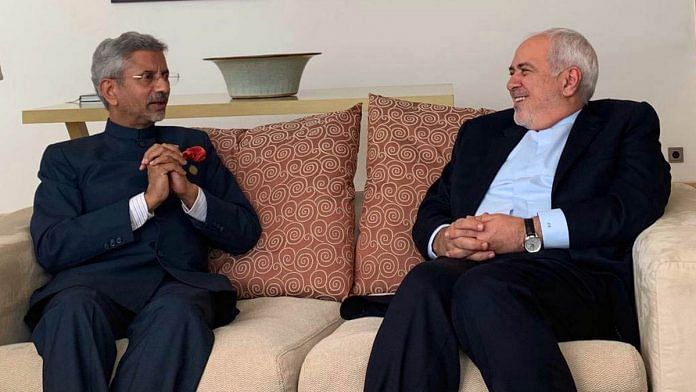New Delhi: India could lose its position as the leading exporter of basmati rice to Iran, with Tehran now beginning to procure the produce from Pakistan, ThePrint has learnt.
For the first time in decades, basmati rice exports from India to Iran have fallen drastically in the first half of 2020-21 fiscal owing to disruption in payments, a result of the US-led sanctions. New Delhi and Tehran are now exploring a conventional barter trading system to address the rising concerns.
The matter was discussed between External Affairs Minister S. Jaishankar and his Iranian counterpart Javad Zarif during the former’s recent visit to that country. Jaishankar had made a stopover in Tehran while on his way to Moscow last week for the Shanghai Cooperation Organisation’s foreign ministers’ meeting .
India and Iran have been discussing the barter trading system for nearly a year now, ever since the Donald Trump administration began imposing tough economic sanctions on Tehran.
Iran has said it will buy basmati rice, sugar and medicines from India in lieu of fertilisers. New Delhi, however, is yet to firm up its decision, Iranian government sources told ThePrint.
Iran is now importing basmati rice from Pakistan while Indian consignments worth Rs 1,500 crore are stuck owing to payment issues, the sources said, adding that Tehran has now asked New Delhi to quickly move on this decision by utilising the banking channels of UCO Bank and IDBI Bank that continue to maintain a presence there.
Also read: India asserts Afghanistan’s ‘national sovereignty’ as peace talks with Taliban start in Qatar
Sanctions and the barter system
Due to the US sanctions on Iran, it has become difficult for Indian banks to operate the payment mechanism, while exporters are finding it increasingly difficult to sell rice in that market.
Some of the exporters, who used to ship their basmati rice consignments through Dubai, have now come under the scanner of investigating agencies.
The Indian government believes a traditional barter trading system with Iran will be difficult since India has stopped buying crude oil from that country. This is because India exports basmati rice worth $1 billion to that market, and hence buying fertilisers worth that amount will not be cost-effective, according to Indian government sources.
Meanwhile, the Ministry of Commerce and Industry is exploring the options of extending a limited line of credit to Iran via the EXIM Bank so that the payments issue for Indian exports can be sorted out until the sanctions are lifted.
“Exporters are concerned that rice exports can also come under sanctions and payments have become a huge issue,” said Ajay Sahai, DG and CEO, Federation of Indian Export Organisations (FIEO). “Basmati rice exports to Iran have taken a hit this year. Getting the market back will be difficult if we lose it to other countries, if and when the sanctions are lifted.”
Owing to the US’ unilateral sanctions, India brought down its crude imports from Iran to zero in May last year. In 2019, India was the top exporter of basmati rice to that country, shipping nearly 1.6 million tonnes.
China eyeing massive investments in Iran
While India has made it clear to Iran that it will not be able to make much progress in the next phase of the Chabahar Port project as long as the US sanctions are there, Tehran has asked New Delhi to invest in some of the affiliated projects such as free trade zones, economic enclaves and other logistical infrastructure.
Even though the Chabahar port project was spared from American sanctions, Indian players have shied away from participating in the next phase, which entails constructing a rail link from the port to Zahedan in the Sistan-Baluchistan province and a 218-km road from Zaranj to Delaram.
“India has to see these projects from the perspective of its own national interest and not through the prism of other countries,” said a top Iranian official, who refused to be named. “We are telling India to at least invest in the ancillary projects that will feed into the larger Chabahar project. Many countries are waiting to invest in these projects but we want India to come in but it should not be too late.”
According to the official, India should “utilise this opportunity to be a major partner in the lucrative project” even as China is planning investments of billions of dollars under the new and updated Iran-China strategic partnership deal.
“Wish India also did the same… To be close to China does not mean we are against India,” the official said.
The China-Iran agreement is expected to overshadow even the multi-billion dollar China-Pakistan Economic Corridor. Under this deal, China is also expected to build a major port development project on the Strait of Hormuz.
Also read: Keep talking, disengage fast, keep distance, ease tensions — India-China plan for LAC peace



